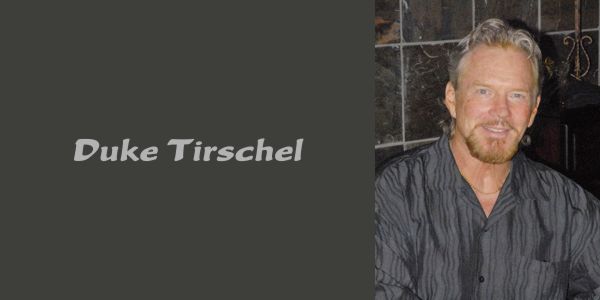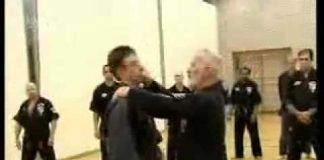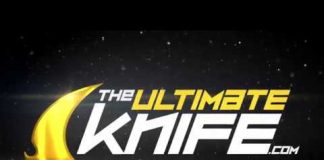Besides being the Official Photographer for World Black Belt he has been the photographer to martial artists in nearly every state in the union and Canada for the past forty years. From magazine covers to martial art school photography to tournament action and more. So much more that perhaps a good definition for him would be that of a Renaissance Man.
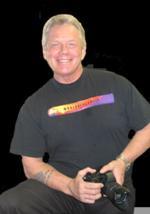
WBB: In looking over the array of actions you’ve taken throughout your life I see two major functions popping up time after time. And without blowing the whistle I wanted to ask you to tell me if my perception is correct.
DUKE: I think I know where you’re going with that and you might be right. The ministry has been a foundation to which I turned to in later years and acting and stunt work has been fun but no matter what else I did it seemed as though I always ended up doing something in either martial arts or photography. That’s why I decided years ago to combine the two and operate a Martial Art Photography business.
WBB: What came first, the karate or the photography?
DUKE: Actually, karate wasn’t the first martial art I studied. It was boxing and then judo and then karate. But my martial art training and the photography came at the same time, 46 years ago. I turned 16 years old the day I walked into Gateway Boxing Club and met Bubbles Klice, the most knowledgeable boxing manager I ever knew. He was stereotypical of a boxing coach and manager. He was a short man with gray peppered in his short cropped black hair. He always wore a vest with a dress shirt with the sleeves rolled up and always had a towel over one shoulder and I never saw him when he wasn’t chomping on a half smoked unlit cigar. I was only 16 years old and as his wonder boy for the upcoming Golden Gloves he let me go one round with World Middleweight Champion Joey Giardello and in the months to come he let me go with Willie Vaughn and Spider Webb. They too became World Boxing Champions.
Duke answered with energy and excitement and then abruptly stopped. I was waiting for him to continue with his story when I noticed that even before he stopped talking it seemed as if he was looking right through me. I was uncomfortable in the silence that followed but I thought I would wait out what thought he might be measuring to say.
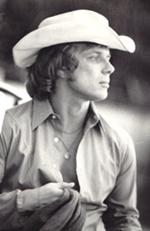 DUKE: Man, I was only 16 years old. The Kansas City Star and other neighborhood newspapers would interview me over the phone and give me great coverage in the paper after the matches I would win. I was just thinking, I didn’t know at the time how important that time in my life could have been. We were getting me ready for the Golden Gloves, and still; I didn’t know what that meant for me.
DUKE: Man, I was only 16 years old. The Kansas City Star and other neighborhood newspapers would interview me over the phone and give me great coverage in the paper after the matches I would win. I was just thinking, I didn’t know at the time how important that time in my life could have been. We were getting me ready for the Golden Gloves, and still; I didn’t know what that meant for me.
WBB: The Golden Gloves is a tournament? How could being in a tournament mean that much?
DUKE: Well you see, it wasn’t just being in the Golden Gloves that would have done anything. It was that everyone who knew anything about the fight game had me down as winning it. The Golden Gloves is put on by the AAU, the American Athletic Union and it wasn’t until 1960 at the Seattle Golden Gloves that I realized what I let slip away. I didn’t make my weight because of poor training and so I took Pappy Glacier’s spot as coach for the Whidbey Island Naval Air Station boxing team. I saw Nikos Spanokos and his twin brother fight and I saw Quincy Daniels fight and I thought they were all pretty good. I would have been in Quincy Daniels weight division and although he looked good I had no doubts that I would have beat him. All three, the Spanokos brothers and Quincy Daniels won there and went to the Olympics. Nikos Spanokos and Quincy Daniels won the gold medal in the Olympics that year.
WBB: So, you’re saying you could of won the Olympics.
DUKE: Well, I’m saying I coulda, I woulda, I shoulda … three of my worst enemies throughout my life. And it all stemmed from not looking forward, from not thinking ahead or being able to see the larger picture.
WBB: But how could you have known what was down the road if you’ve never been there?
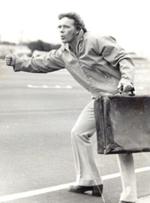
DUKE: Because there were people who told me what was down the road. There was the press and publicity that clearly showed that I was for real and I had something to train for. Iheard their words but I didn’t know for what picture of life the words would have any meaning for me. So I partied and slacked on training. I figured that what I benefited from boxing was to be tough enough to run in a bad crowd and demand respect. I went for the small picture; to be able to beat someone in a fight on the street. It wasn’t long before my dad caught me with a sucker punch and threw me out the front door. I was bare foot and had no shirt on and only had on a pair of jeans and so having no place else to go, I stopped a half block down the street and turned to go back and face him. He didn’t see me but I saw him. He came out on the front porch loading a 22 rifle, got in his car and started hunting for me. Needless to say I didn’t ever go back and so at 16 years old I was sleeping in parked cars that I found unlocked and in alleys and by the time the Golden Gloves came around I was in McCune Reform School.
WBB: It sounds like you didn’t have much of a chance.
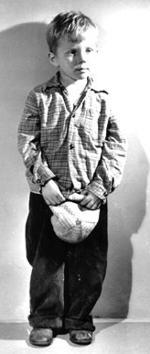
DUKE: NO! That’s not what I’m saying. You know after I was kicked out of the house I was kicked out of school. My dad didn’t kick me out of the house because I was a model kid. I wasn’t even allowed in the house unless he was there because my step mother was afraid of me. I wasn’t kicked out of school because I was handing into too much homework. What I’m saying here about all of this is not meant to be a cop out of why I didn’t win something I say I could have won. If there’s any message at all in what I said, the message would be to not take for granted the small successes we have in life because they could lead to places we will only be able to dream of being someday.
WBB: You said you were doing photography at this time too. If all this was going on what were you doing with photography?
DUKE: Well oddly enough I was working for my father since I was fourteen years old. He was a photographer in Kansas City and my uncles in Chicago were photographers. Our family were always photographers and my dad was trying to show me the business at an early age and probably had some high hopes for me but things didn’t work out that way.
WBB: I guess being in a reform school stopped the training in photography as well as boxing.
DUKE: It closed a lot off to me but an odd thing happened. I wasn’t aware of it at the time but by a strange twist of fate being in reform school opened something for me that took more than forty years for me to discover.
WBB: Forty years? You stayed connected with those people or that school all those years?
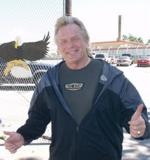
DUKE: It wasn’t exactly like that but I did go back there just six months ago. I gave my prison ministry program “It Doesn’t Have To Be This Way” to 100 kids there. But the connection I
made wasn’t from McCune, it was just because I was there. When I got there I learned that I had to fight the current “Duke of the Hill”, A.K.A. the toughest guy there, as a right of passage. I won the fight and this is how I became known as “Duke”. While we were there we all ritually watched American Bandstand on television. One of the perks of being “Duke of the hill†was that you had your pick of the Bandstand dancers. By pick, I mean that the girl you chose became known as your girl and the guys would write them letters and pretend they were their boyfriends. If anyone else picked your girl, you would fight them and the winner got the girl. I picked dancer Bunny Gibson and wrote her letters but never mailed them. I even bragged to all of the others that she wrote me back and that we were an item. And there were times I had to fight for her and I won. She was my girl.
WBB: How long were you there?
DUKE: I got out of McCune in 1958 when I was seventeen and a half which was just the right age to join the Marine Corps. The Marine Corps sent me to photography school and later stationed me with a squadron doing aerial photo reconnaissance.
WBB: Did you start boxing again?
DUKE: I boxed some in the Marine Corps but found the new and exciting sport of judo and began studying that until I was discharged in 1963.
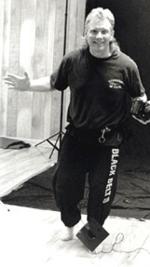
WBB: Is that where you started karate?
DUKE: Oh no. I never heard of karate for another six years. That’s when I went to a Chuck Norris karate studio in Redondo Beach California because I thought it was the same as judo. Pat Burleson gave me a knife and told me to stab him and then when I tried, he cut me in half with a counter side kick. It never dawned on a long time boxer to use the feet like that. He didn’t swing his leg at me, he cocked his leg in one swift move and “punched” me with his foot and I said, “Wow, four weapons to strike with instead of two.” Pat said, “Oh there’s more than that.” And I was hooked on karate.
WBB: Was Pat Burleson your first instructor?
DUKE: No, Pat was standing in for Bob Wall that week and Chuck Norris and Clyde Mills were teaching the classes.
WBB: What was it like learning karate from a big star like Chuck Norris?
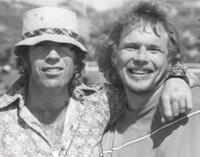
DUKE: Chuck wasn’t a big star back then. He was a karate champion and 1969, when I started with him, was his last year he competed. After that he was in the business of opening karate schools and teaching karate. Bob Wall was his partner and three years later in our relationship Chuck, Bob, and I became partners training karate students to do stuntwork in movies. That was about the time that Bob and Chuck started a career in Motion Pictures. As a matter of fact I can remember Chuck and I were running on the bridle path near his house and he said, “Hey, let’s take acting lessons.” I said, “You got to be joking. Everyone I know who is trying to act is starving.” Well. He went ahead and took the lessons and I didn’t.
When I smiled I saw Duke give me a funny look as if he caught the meaning behind my smile. I thought I would volunteer my thoughts.
WBB: Do you think that was another time that you should have taken a better look at the larger picture?
DUKE: Just when I said that, I thought you might be thinking something like that … but you know I never thought of it like that. Maybe it is. Maybe seeing the bigger picture has something to do with the notion of having vision and then, after having vision to be able to have the discipline to manifest it. And above everything else that Chuck Norris had, he had discipline, focus, and determination.
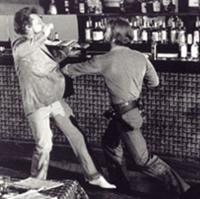
Lone Wolf McQuade
WBB: Well do you think that if you took acting lessons that you
DUKE: Oh now wait a minute. Nope! I know it wouldn’t have happened.
WBB: But you have discipline. Look at all you’ve done. You certainly must have what it takes to manifest a vision.
DUKE: You’re right, I do. I have what it takes to accomplish some thing but in order to be consistent with your accomplishments you have to have a vision. A vision isn’t a wish. Chuck use to say anyone can be a winner but to be a champion one must win consistently. He would tell us that we need to get a mental image in our head of exactly what it is we want to achieve and to keep that image there, and that we shouldn’t let anything distract us from the passion it takes to reach our goal. That’s vision and that’s discipline.
WBB: How do you account for the people who have the vision and discipline but never make it? Isn’t it important to get the right breaks along the way?
DUKE: Yes and no. Breaks can help but it isn’t the break that helps you, it’s what you do with the breaks that you get. But you see it also works this way. It’s what you do with the breaks you don’t get. So it always comes back to you and not the break. It comes back to what you’re made of and how ready you are to claim your inheritance. Let me give you a perfect example. Steve McQueen and I never got to know each other very well but in a long telephone conversation one night he told me about vision and discipline. He didn’t use those words. Instead he told me this, “Duke, what you need to have is purpose and direction.” And then he proceeded to advise me on many things I needed to know. The reason he was telling me these things was because about a month earlier he called me out of the blue. We hadn’t talked in months. We didn’t part in the best conditions. But one day I was sitting in my karate studio in Redondo Beach all by myself and the phone rang and it was Steve McQueen. We talked briefly about how much I enjoyed being around the movie industry and he said this, “Here’s what I want you to do. Get an acting coach, an agent, and a headshot and I will open the doors.” When we hung up I walked in circles around the mat in my empty karate studio talking to myself. I couldn’t believe the break that I just received. I had it all except for what I needed most. I didn’t have me. I had no idea who I was or what I wanted in life but this looked to be a good thing and so I got excited over it. But it wasn’t me. Being an actor wasn’t who I was and so I let my ego get the better of me and made a lot of mistakes socially and professionally and before long the offer was withdrawn and the “opportunity” was gone. I booted myself for messing up what I thought was an opportunity of a lifetime.
The biggest mistake I made was to beat myself up for thinking I should have taken that opportunity and become a success with it.
WBB: You lost me now. Wouldn’t anyone be mad at themselves for letting a chance like that to get away?
DUKE: A chance like what? I would have never been a success at being who I am not. I’m not an actor. I’m a photographer. I’m a Martial Artist. I’m a Martial Art Photographer. It took me too many years to realize that if you are going to be involved in self-expression you have to first have a self to express and finding that self in me has been quite a journey. Because of Chuck Norris and Bob Wall I have a vision and I have the discipline to manifest it. And so now, I have what Steve McQueen told me I should have purpose and direction. And having that I enjoy my life knowing that I do have a place to go and a reason to get there.
The journey Duke mentioned taking has been quite diverse and varied and that’s why I referred to him as a Renaissance Man.
He has been an undefeated boxer and professional full contact fighter, body guard for Steve McQueen, partners with Chuck Norris and Bob Wall in a karate stunt workshop, vice president of an advertising agency in Los Angeles, a tech rep for the Industrial Marketing division of Polaroid Corporation, owner of a chain of karate studios, National Director for Chuck Norris’ UFAF organization, author of two books on karate and fitness published by Bantam, official photographer for the Modern Penthalon in the 1996 Olympics, writer and photographer for several Martial Arts magazines including the Martial Art Insider, president for the American Fighting Arts Federation, heads a Georgia based Karate Ministry, graduated with a Bachelor of Science degree in Marketing from the University of California Long Beach, Post Certified Instructor at the Georgia Police Academy, International Karate Champion, California Heavyweight Professional Karate Champion, member of SAG and AFTRA and appeared in major motion pictures and television with Burt Reynolds, Patty Duke, Chuck Norris, Bob Wall, Julie Andrews, David Carradine and many others, presently working on his Masters at the Jacksonville Theological Seminary, associate pastor at the Church of God in Rex Georgia, minister with the Charles Stanley’s First Baptist Church Prison Ministry in Atlanta Georgia.
Duke started the Martial Art School Photography program in America over thirty years ago and still travels to 38 states and Canada photographing everyday Martial Artists practicing their art. If that isn’t enough Duke is finishing up on his next book called “Man-To-Man”, working on a script for a video on Christian Karate and Spiritual Survival, and we feel that we are fortunate to have Duke as our Official Photographer for the World Black Belt Organization.
WBB : There’s still something here that I don’t think is quite clear. Earlier you mentioned that a “strange twist of fate” opened some door to you when you were in reform school. Did I miss something? What was this discovery that took you forty years to make?

